April 2, 2024
Conferences
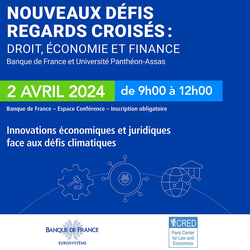
🌐follow Marie-Anne Frison-Roche on LinkedIn
🌐subscribe to the Newsletter MAFR Regulation, Compliance, Law
____
► Full Reference: M.-A. Frison-Roche, "Les voies d'innovations juridiques face aux nouveaux "défis climatiques" ("Innovative legal solutions to the new "climate challenges""), in C. Arnaud, O. de Bandt et B. Deffains (dir.), Nouveaux défis - Regards croisés : Droit, Économie et Finance. Quel Droit face au Changement Climatique ? (("New challenges - Crossed perspectives : Law, Economics and Finance. What Law in the Face of Climate Change?"), Banque de France (French Central Bank) and CRED/Paris Panthéon-Assas University, Paris, Centre de Conférence de la Banque de France, April 2, 2024
____
🧮See the full programme of this event
____
🔲see the slides, basis of this conference (in French)
____
► Summary of this conference: In response to the question of how the Law can produce 'innovations' to meet the 'climate challenges', the process is based on the three traditional sources of Law, which are, firstly, laws and regulations, secondly, the commitments of individuals, mainly contracts, and thirdly, court rulings.
At first sight, the Law in its traditional conception and practice is weak in the face of climate change. This weakness is inherent in the nature of climate change, which is at once future, global and systemic, in the face of these three sources of Law, which do not address all three dimensions at once. The scale of the legal innovation required to ensure that one or more articulated sources can grasp the future, the global and the systemic is therefore clear. And yet this is what is happening.
As far as laws and regulations are concerned, they do not seem very appropriate because they are, by their very nature, a territorial limit, and international treaties are very difficult to negotiate. The interweaving of European regulations, for example the CSRD and the CS3D, which mirror each other, may be more effective. As far as 'commitments' are concerned, a concept which in Law is not very precise outside of contracts and liability cases, contracts are above all a means for companies to fulfill their legal obligations, and a contract always implies a judge. At first sight, however, the judge is the least well placed to respond to 'climate challenges', particularly in France where he is said or wished to be powerless, where he rules on the past and where, especially the civil judge, he settles a one-off dispute between two singular parties.
But a major change has occurred with the emergence of a new branch of law: the Compliance Law, a teleological branch of Law whose legal normativity is lodged in the Monumental Goals that it pursues, namely the preservation of systems, for example the climate system. In France, the so-called "Sapin 2" law in 2016, followed by the so-called "Vigilance" law in 2017, illustrate this. And the Judge is at the centre of it all.
In this global, systemic, extraterritorial perspective, the object of which is the future - Compliance Law is, moreover, rejected by many legal experts - the legislative innovation is major. Indeed, the law of 23 March 2017, known as "Vigilance" designated large companies, because they are "powerful", because they are "in a position to act" to "detect and prevent" breaches of the environment and human rights. The 2017 law copied the "compliance tools" put in place by the Sapin 2 anti-corruption law: risk mapping, plans, alerts, audits, internal investigations, and so on.
Only large companies are subject to the Compliance Law, notably the Vigilance Law, since they are the only ones in a position to act, in this case "parent companies or principals", and borders are no longer limits since the obligation, creating personal liability for the company, extends throughout the "value chain". The notion and fact of "systemic dispute" is emerging before the courts. In France, the Paris Court of First Instance has exclusive jurisdiction. European legislation is proving more difficult to draw up, because although it is compulsory to provide information on these "extra-financial" subjects (CSRD), the directive on the duty of vigilance, which has just been adopted, does not go any further than the French law of 2017.
On the second point, that of commitments, we are only at the beginning. Judges do not transform ethical statements into "unilateral legal commitments", and vigilance does not transform company law into co-management. But contracts do form a global network through which companies adjust their various legal obligations. This is why arbitrators, the only "global judges", will soon be involved in this systemic litigation, and more general case law is to come on "contracts and compliance clauses".
But the most innovative aspect undoubtedly comes from the courts. Perhaps and notably in France because it is from where we least expect it, the civil courts, that the imagination comes, but also the guarding of the great principles of the Rule of Law, because for the moment the case law is reasonable. This innovation has not come about proprio motu: the judges are not taking action, it is the NGOs that are conducting a kind of litigation policy, systematically giving formal notice to the major energy companies, but also to the major banks and insurers on climate issues, alleging non-compliance with their vigilance plans. The interim relief judge at the Paris Court of First Instance must then provide answers in systemic disputes, of which the so-called "Total Uganda" case is an example.
The courts are demonstrating a great deal of innovation. The Court of First Instance's interim relief judge has appointed amici curiae, the Paris Court of Appeal has set up a specialised chamber, and training conferences have been set up on this "Emerging Systemic Litigation".
In conclusion, the Law is in the process of being rebuilt through a new branch of Law, the Compliance Law, whose the very purpose, as an extension of and going beyond the Regulatory Law, is to preserve systems, in particular the climate system, in a profoundly renewed role for judges.
________
Oct. 19, 2023
Thesaurus : Doctrine
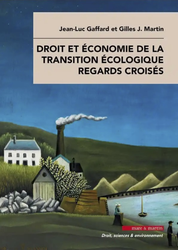
► Référence complète : J.-L. Gaffard & G. J. Martin (dir.), Droit et économie de la transition écologique. Regards croisés, Mare & Martin, coll. "Mare & Martin", 2023, 168 p.
____
____
____
► Résumé de l'ouvrage (fait par les auteurs) : "La transition écologique ne se décrète pas, elle se construit pas à pas. Le caractère irréductible de la contradiction entre activité humaine et préservation des éléments naturels ne saurait conduire à nier la complexité des rapports économiques et sociaux nécessaires pour y survivre. Au lieu d'énoncer un discours de vérité absolue que détiendrait un État omniscient ou le libre marché, le propos du présent ouvrage est d'ouvrir un débat démocratique dont l'objet est d'organiser le dissensus et de cultiver le compromis nécessaire pour rendre la transition viable. Pour répondre à ce défi, un regard croisé du Droit et de l'économie s'impose qui permet de souligner aussi bien la pluralité des ordres juridiques et des espaces normatifs que celle des ordres économiques au coeur desquels se trouve l'entreprise.".
________
Sept. 7, 2023
Thesaurus : Doctrine
► Référence complète : F.-G. Trébulle, "L'accueil en droit des enjeux environnementaux, sociaux et de gouvernance", Rev. sociétés, 2023, pp. 471-482.
____
► Résumé de l'article (fait par l'auteur) : "À l'heure où l'on parle de plus en plus des enjeux environnementaux sociaux et de gouvernance en droit des sociétés et en droit financier, il apparaît nécessaire de replacer ce mouvement dans une perspective historique et spatiale pour mesure combien il s'agit d'une illustration ce que l'on pourrait décrire à la fois comme un renouvellement paradigmatique et une manifestation de l'évidence de la nécessité d'un renouveau du rapport du droit aux conséquences des activités menées. L'accueil en droit des enjeux ESG relève peut-être tout simplement de la nécessité et de l'évidence."
___
🦉Cet article est accessible en texte intégral pour les personnes inscrites aux enseignements de la Professeure Marie-Anne Frison-Roche
________
Sept. 7, 2023
Thesaurus : Doctrine

► Full Reference: M. Torre Schaub, A. Stevignon and B. Lormeteau (ed.), Les risques climatiques à l'épreuve du droit, Mare & Martin, coll. "Collection de l'Institut des sciences juridique et philosophique de la Sorbonne", 2023, 362 p.
____
► read the table of content (in French)
____
► read the backcover (in French)
____
► Summary of the book (done by the publisher, in French): "Le présent ouvrage explore l’appréhension juridique d’un nouveau concept : le « risque de transition », concept découlant du changement climatique. En effet, le phénomène du changement climatique crée et amplifie des aléas qui sont à l’origine de plusieurs périls encore peu considérés par le droit (risques contentieux, financiers et réglementaires). Pour assurer la pérennité de nos sociétés, toutes les dimensions de ces dangers doivent être identifiées et traitées. Les contributions proposées ont pour objectif de dresser une typologie des risques climatiques et de présenter des pistes juridiques pour y faire face. À l’échelon global, national et territorial, se pose la question de la reformulation de la responsabilité des États, mais également des acteurs privés (entreprises, banques, sociétés d’investissement), face aux aléas non maîtrisés. De nouvelles législations et réglementations internationales, européennes et nationales émergent, tendant à aborder ces risques. Cet ouvrage en fait état, ainsi que des développements contentieux climatiques inédits que s’y rattachent.".
____
📝read the article of Marie-Anne Frison-Roche : "Droit de la compliance et climat. Pour prévenir le risque et construire l'équilibre climatiques" ("Compliance Law and climate. Prevent the climate risk and build the climate balance")
________
June 21, 2023
Conferences
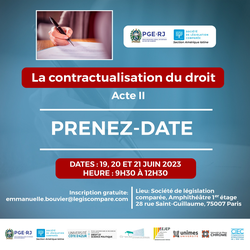
♾️follow Marie-Anne Frison-Roche on LinkedIn
♾️subscribe to the Newsletter MAFR Regulation, Compliance, Law
____
► Full Reference: M.-A. Frison-Roche, "Favoriser ou pas la « contractualisation » du Droit" ("To favour or not the "contractualisation" of the Law"), final speech in Société de législation comparée (SLC) and Procuradoria Geral do Estado do Rio de Janeiro (PGE-RJ), La contractualisation du droit. Acte II, Paris, 21 June 2023.
____
🧮See the full programme of this event (in French).
The conference is held in French
________

June 21, 2023
Publications

♾️follow Marie-Anne Frison-Roche on LinkedIn
♾️subscribe to the Newsletter MAFR Regulation, Compliance, Law
____
► Full Reference: M.-A. Frison-Roche, Conditions required to promote the "contractualisation" of the Law, Working Paper, June 2023.
____
🎤This Working Paper has been done as a basis for the closing conference of the colloquia La contractualisation du droit. Acte II, organised by the Société de législation comparée (SLC) and the Procuradoria Geral do Estado do Rio de Janeiro (PGE-RJ), on 19, 20 and 21 June 2023.
____
📝It is also the basis of the article that will be published.
____
► English Summary of the Working Paper :
____
🔓read the Working Paper⤵️
March 30, 2023
Thesaurus : Doctrine
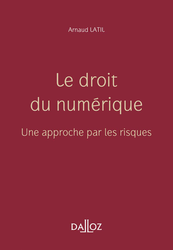
► Référence complète : A. Latil, Le droit du numérique. Une approche par les risques, Hors Collection, Dalloz, 2023, 300 p.
____
____
____
► Résumé de l'ouvrage (fait par l'auteur) : "Le droit du numérique est une matière en pleine construction. Cet ouvrage propose d'éclairer son histoire, ses évolutions et ses nombreuses ramifications. en droit civil, en droit de la consommation et en droit pénal. mais aussi en droit administratif et en matière de libertés fondamentales. Il envisage les activités numériques comme la mise en oeuvre de techniques. au même titre que les techniques industrielles ou scientifiques.
Le droit du numérique est fondé sur une « approche par les risques ». Cette approche est aujourd'hui au centre des politiques publiques européennes et internationales. Elle s'applique au droit des marchés financiers, au droit alimentaire ou encore au droit de la cybersécurité. Ses trois dimensions sont ici explorées : l'approche par les risques est libérale. préventive et résiliente.
Le droit des risques trouve ses racines dans la philosophie et la sociologie des techniques. Il vise la protection de la santé, de la sécurité et des droits fondamentaux en mobilisant des notions complexes. comme la confiance, la neutralité, la souveraineté, l'innovation ou encore la résilience. Le droit des risques reste cependant encore mal connu. Il est pourtant à l'origine de mutations majeures de nos systèmes juridiques.".
________
Oct. 27, 2022
Editorial responsibilities : Direction of the collection "Cours-Série Droit privé", Editions Dalloz (33)
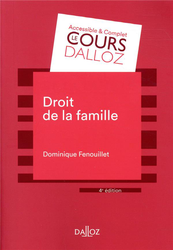
► Référence complète : D. Fenouillet, Droit de la famille, Coll. "Cours Dalloz-Série Droit privé", Dalloz, 1ière éd., 1997, 5ième éd., 2022, 673 p.
____
► Ce manuel à jour des derniers textes s'adresse à tous les étudiants en droit et à tous les praticiens qui actualisent leurs connaissances en droit de la famille.
Il traite dans une première partie des « couples », (marié, démariés, hors mariage), pour consacrer sa deuxième partie à « l'enfant », (rattachement et statut).
Enfin, il finit par développer dans une dernière partie sur « la famille au-delà », (nom, obligation alimentaire et patrimoine de la famille).
____
Consulter l'ensemble de la collection dans laquelle l'ouvrage a été publié.
Updated: Sept. 5, 2019 (Initial publication: April 30, 2019)
Publications
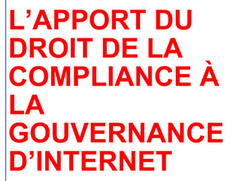
♾️ follow Marie-Anne Frison-Roche on LinkedIn
♾️subscribe to the Newsletter MAFR Regulation, Compliance, Law
____
► Full Reference: M.-A. Frison-Roche, L'apport du Droit de la Compliance dans la Gouvernance d'Internet (The contribution of Compliance Law to the Internet Governance), Report asked by the French Government, published the 15th of July 2019, 139 p.
___
► Report Summary. Governing the Internet? Compliance Law can help.
Compliance Law is for the Policy Maker to aim for global goals that they require to be achieved by companies in a position to do so. In the digital space built on the sole principle of Liberty, the Politics must insert a second principle: the Person. The respect of this One, in balance with the Freedom, can be required by the Policy Maker via Compliance Law, which internalises this specific pretention in the digital companies. Liberalism and Humanism become the two pillars of Internet Governance.
The humanism of European Compliance Law then enriches US Compliance law. The crucial digital operators thus forced, like Facebook, YouTube, Google, etc., must then exercise powers only to better achieve these goals to protect persons (against hatred, inadequate exploitation of data, terrorism, violation of intellectual property, etc.). They must guarantee the rights of individuals, including intellectual property rights. To do this, they must be recognized as "second level regulators", supervised by Public Authorities.
This governance of the Internet by Compliance Law is ongoing. By the European Banking Union. By green finance. By the GDPR. We must force the line and give unity and simplicity that are still lacking, by infusing a political dimension to Compliance: the Person. The European Court of Justice has always done it. The European Commission through its DG Connect is ready.
► 📓 Read the reporte (in French)
📝 Read the Report Summary in 3 pages (in English)
📝 Read the Report Summary in 6 pages (in English)
____
► Plan of the Report (4 chapters): an ascertainment of the digitization of the world (1), the challenge of civilization that this constitutes (2), the relations of Compliance mechanisms as it should be conceived between Europe and the United States, not to mention that the world is not limited to them, with the concrete solutions that result from this (3) and concrete practical solutions to better organize an effective digital governance, inspired by what is particularly in the banking sector, and continuing what has already been done in Europe in the digital field, which has already made it exemplary and what it must continue, France can be force of proposal by the example (4).
____
📝 Read the written presentation of the Report done by Minister Cédric O (in French).
____
💬 Read the interview published the 18 July 2019 : "Gouvernance d'Internet : un enjeu de civilisation" ( "Governing Internet: an Issue of Civilization"), given in French,
📻 Listen the Radio broadcast of July 21, 2019 during which its consequences are applied to the cryptocurrency "Libra" (given in French)
🏛 Presentation of the Report to the Conseil Supérieur de l'Audiovisuel- CSA (French Council of Audiovisual) on Septembre 5, by a discussion with its members presentation (in French)
💬 Read the Interview published the 20 December 2019 : "Le droit de la compliance pour réguler l'Internet" ("Compliance Law for regulate Internet"), given in French
____
read below the 54 propositions of the Report ⤵️
May 29, 2019
Thesaurus : Doctrine
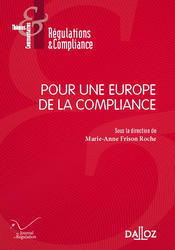
► Full Reference: J.-Cl. Marin, "Quels outils pour la construction du droit de la compliance en Europe ?" ("What tools are needed to build Compliance Law in Europe?"), in M.-A. Frison-Roche (ed.), Pour une Europe de la Compliance, series "Régulations & Compliance", Dalloz, 2019, p. 67-72.
____
📕read a general presentation of the book, Pour une Europe de la Compliance, in which this article is published
____
► Summary of the article (done by the Journal of Regulation & Compliance):
____
🦉This article is available in full text to those registered for Professor Marie-Anne Frison-Roche's courses
________
May 16, 2019
Publications

Référence complète : Frison-Roche, M.-A., Game of Thrones : un droit si classique. Pour l'instant, in Le Pluard, Q., et Plouhinec, P., (dir.), Du droit dans GAME OF THRONES, 2019, pp. 19-34.
Résumé. Dans cette série emplie de surprises grandioses, de personnages épiques, de retournements, et ce d’autant plus qu’elle se mit à courir plus vite que le livre dont elle naquit, on semble ne trouver que ce que l'on connaît déjà du Droit : il suffirait de soulever les déguisements, comme on le fait dans une fable. On y retrouve alors les règles juridiques classiques (I), la reproduction en décalque de l'organisation juridique féodale (II), parfois contestée au nom de principes exogènes (III). Mais il est remarquable que la série ne soit pas encore finie. Or, ce qui va arriver ne renvoie-t-il pas à des problématiques juridiques que nous ne maîtrisons pas nous-mêmes ? Saison inconnue au sens plein du terme, terrain juridique glacé et sol incertain d’un Droit qui prendrait la forme des "sans-visages" et des "morts qui marchent" ? (IV).
Consulter une présentation générale de l'ouvrage.
April 15, 2019
Publications : Chronicles MAFR - Compliance Law

► Full Reference : Frison-Roche, M.-A., Compliance et personnalité, in Recueil Dalloz, n°11/7812, avril 2019, pp. 604-606
_____
► Chronique English Summary: Compliance is often presented as a set of mechanical procedures, in which human beings are absent. It's the opposite.
It is an Information Law, in its function of preventing systemic risks and a markets protection Law, which poses the requirement of knowing “truly” the person who is “relevant”, generalizing what Company or Competition Law had partially admitted.
Even more, beyond systems, Compliance Law, insofar as it is a Protection Law, aims to protect human beings, directly or indirectly concerned, establishing them as legal persons, true final subjects of law of this new branch of Law.
____
📝read the chronique (in French).
____
____
📖 read the other chroniques Chronique MAFR Droit de la Compliance
________
Nov. 28, 2018
Publications
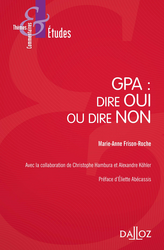
Référence complète : Frison-Roche, M.-A., GPA : dire Oui ou dire Non, avec la collaboration de Christophe Hambura et Alexandre Köhler, préface d'Éliette Abécassis, Dalloz, novembre 2018, 161 p.
_________
Les situations juridiques de GPA et les différents droits applicables sont souvent présentés comme « complexes ». C'est faux. Il s'agit toujours d'une femme qui « consent » à porter un enfant pour le donner à la naissance à ceux qui ont commandé sa venue au monde. Face à ce fait simple, le Droit choisit soit d'instituer un lien de filiation entre la femme et l'enfant soit de l'instituer entre l'enfant et ceux qui l'ont désiré. Dans le premier cas, c'est la maternité qui fait la filiation, dans le second cas c'est le pur désir d'enfant. Dans le premier cas, les entreprises sont exclues car on ne peut vendre le lien de maternité, dans le second cas elles sont centrales car on paye pour concrétiser son désir d'enfant. Le choix est aujourd'hui ouvert. C'est un choix de société.
Les États-Unis et l'Europe sont souvent présentés comme ayant fait les mêmes choix. C'est faux. La Californie a fait le choix du désir d'enfant, servi par le consentement, l'argent et le contrat. L'Europe s'y refuse : pour protéger les êtres humains, lois et juges ne scindent pas le corps des femmes et des enfants de la notion de « personne ».
Comment et jusqu'à quand ?
Consulter la table des matières.
Nov. 27, 2018
Publications
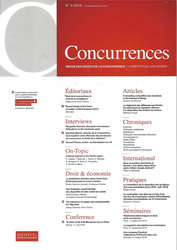
► Full Reference : Frison-Roche, M.-A., Droit de la concurrence et droit de la compliance ("Competition Law and Compliance Law), November 2018, in Revue Concurrences n° 4-2018, Art. n° 88053, pp. 1-4.
_____
► Summary: Compliance Law is a new branch of Law, still under construction. One can have a “narrow definition” of seeing it as the obligation of businesses to show that they are constantly and actively complying with the law. One can have a richer definition, of a substantive nature, defining it as the obligation or the own will of certain companies to achieve “monumental goals” that go beyond economic and financial performance. Competition Law partly integrates its two conceptions of Compliance: Precursor, Competition Law concretizes dynamically the first conception of Compliance Law. It is with more difficulties but also much more future that Competition Law can express in dialectic the second conception of Compliance Law as internationalization of these “monumental goals”, especially in the digital space.
📝 read the article (in French)
________
Nov. 21, 2018
Publications
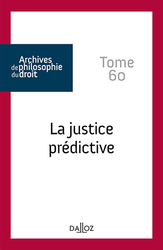
Référence générale : Frison-Roche M.-A., Pour protéger les êtres humains, l'impératif éthique de la notion juridique de personne, in in "Droit et Ethique" (dossier spécial des Archives de Philosophie du Droit) Archives de Philosophie du droit (APD), La justice prédictive, Dalloz, 2018, z, pp. 363-378.
Résumé : C'est par le Droit que l'être humain a acquis en Occident une unité (I). Ce que la Religion avait pu faire, le Droit l'a également fait en posant sur chaque être humain la notion indétachable de lui de « personne » (I.A). Mais c'est cela qui est remis en cause aujourd'hui, non pas la personnalité et le pouvoir que l'être humain a d'exprimer sa liberté mais l'unité que cela implique dans la disposition que l'on a de soir en repoussant le désir qu'autrui a toujours eu de disposer de nous. Le Droit actuel tend en effet à « pulvériser » les êtres humains en données et à transformer en prestations juridique de « consentement », cessant d'être une preuve d'une volonté libre mais devenue une notion autonome , y suffirait (I.B.).
Pour empêcher que ne règne plus que la « loi des désirs », laquelle ne fait que traduire l'ajustement des forces, il faut requérir ici et maintenant la souveraineté éthique du Droit, parce que le Droit ne peut pas être qu'une technique d'ajustement des intérêts (II). L'on peut former cette requête si l'on ne veut pas vivre dans un univers a-moral (II.A), si l'on constate que l'unité de la personne est l'invention juridique qui protège l'être humain faible (II.B.). Si on en admet l'impératif, il faut alors se demander enfin qui en Droit va l'exprimer et l'imposer, notamment de la Loi, ou du Juge, car nous semblons avoir perdu la capacité de rappeler ce principe de la Personne sur laquelle l'Occident fut si centré. Or, les principes qui ne sont plus dits disparaissent. Il ne resterait plus alors que l'ajustement au cas par cas des intérêts entre êtres humains dans champ mondial des forces particulières. À cette aune, le Droit ne serait plus qu'une technique de sécurisation des ajustements particuliers. (II.C). Réduit à cela, le Droit aurait perdu son lien avec l'Éthique.
Consulter une présentation de l'ouvrage dans lequel l'article est publié.
Voir la présentation d'autres tomes des Archives de Philosophie du Droit.
Oct. 10, 2018
Thesaurus : Doctrine
► Référence complète : M. Fabre-Magnan, L'institution de la liberté, PUF, 2018, 352 p.
____
► lire la 4ième de couverture
____
► lire la table des matières
____
► Résumé de l'ouvrage (fait par l'éditeur) : "L’interdit est-il l’ennemi de la liberté ? Celle-ci est-elle toujours du côté du permis ? Cet ouvrage montre que la réponse à ces questions n’est pas si simple. Le consentement et le contrat ne suffisent pas à garantir la liberté, et ils en sont même parfois les fossoyeurs ; à l’inverse, l’interdit ou la dignité n’en sont pas toujours les ennemis.
La simple non-ingérence de l’État ne suffit en réalité pas pour assurer l’autonomie des personnes et le pluralisme des choix de vie. Le droit a alors un rôle à jouer pour soutenir la liberté, entendue comme le projet et le processus d’émancipation de tous et de chacun. La liberté des modernes et les droits de l’homme doivent être défendus. Mais conforter les acquis de la liberté individuelle suppose de s’intéresser à ce dont elle a besoin pour être instituée, et ce afin d’éviter qu’elle ne se délite ou ne se retourne contre les plus faibles. La liberté ne peut pas être la liberté de détruire ce qui protège et garantit la liberté.".
________
July 26, 2018
Thesaurus : Doctrine
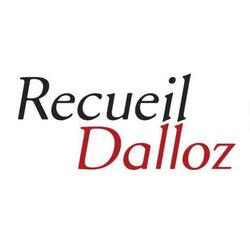
Référence complète : Couret, A., Les figures du procureur privé, in Recueil Dalloz, n°28, 2018, p. 1545
Les étudiants de Sciences-Po peuvent consulter l'article via le drive, dossier " MAFR - Régulation & Compliance "
July 21, 2018
Publications
📝 Le Droit de la Compliance au-delà du Droit de la Régulation (Compliance Law beyond Regulation Law)
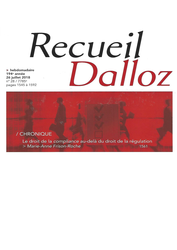
Full reference : Frison-Roche, M.-A., Le Droit de la Compliance au-delà du Droit de la Régulation, Recueil Dalloz, 2018, chronique, pp. 1561-1563.
Summary : A movement started from precise legal requirements linked to identified actors, as the financial or banking sector, to transform itself in legal norms of Compliance. Compliance Law is thus the extension of Regulation Law. But Compliance Law is taking its full autonomy with regards with Regulation Law, while retaining its violence, its radicalisé, and even its archaism, even though it concerns companies which do not act on regulated sectors, putting down, for instance, notions linked to territoriality (I). How companies should react face to this unequaled news (II)?
Read the table of contents of the Review (in French).
This document is based on a working paper with footnotes, technical references and hypertext links.
July 3, 2018
Thesaurus : Doctrine

Référence complète : Périn-Dureau, A., Le droit à l'épreuve du temps, in Études en l'honneur de Philippe Neau-Leduc, Le juriste dans la cité, coll. « Les mélanges », LGDJ- Lextenso, 2018, pp.785-790.
Lire une présentation générale dans lequel l'article est publié.
July 3, 2018
Publications

► Full Reference: Frison-Roche, M.-A., Dessiner les cercles du Droit de la Compliance, in Études en l'honneur de Philippe Neau-Leduc, Le juriste dans la cité, coll. « Les mélanges », LGDJ-Lextenso, 2018, pp. 483-496.
____
🚧this article is based on a Working Paper, with footnotes, technical references and hypertext links.
This Working Paper is freely available :
- in French: Tracer les cercles du Droit de la Compliance.
- in English: Drawing the circles of Compliance Law.
____
► English Summary of this article: Compliance Law has the same teleological functioning as the Economic Law to which it belongs, which consists in placing the normativity of rules, decisions and reasoning in the aims pursued. Once we know what the goals of compliance techniques are, then we know who should be responsible for them, who must be subject to them, who must activate the rules: compliance rules must be activated by those who are in the best position to achieve the outcome in order to achieve the goal sought by the authority which designed the compliance mechanism. The "circles" are thus plotted in a rational and pragmatic way. That, all of it ("useful effect"), but not beyond that. The notion of efficiency does not always imply balancing: on the contrary, it can involve drawing circles which designate those who are "placed" to carry the burden of the rules because they are capable of producing them the desired effects. Within these circles, the rules must apply without restriction and without compromise, but they must not apply beyond these circles.
Drawing such circles requires defining the Law of Compliance itself, since on the one hand the choice of those who must implement the Compliance depends on the aims of the Compliance and on the other hand the definition of the Law of Compliance is itself teleological in nature. This is why, contrary to the assertion that the exercise of definition would be useless in these matters, which would be above all on a case-by-case basis, this effort to define and determine the purposes is, on the contrary, necessary in practice to show which enterprise must bear the obligations of compliance and which must not.
But it is enough to have posed this to reveal the major difficulty of the Compliance, that explains resistances, and even gives the impression that one is confronted with an aporia. If, as a matter of principle, what is expected of the "users" of the Compliance mechanisms must be articulated to the aim that is affected by the authors of the compliance mechanisms to them, we must have a minimum correspondence between the aims of these authors (Legislators and Regulators) and the aims pursued by those who are responsible for implementing them: companies. However, this correspondence does not exist at first sight, because the compliance mechanisms are found to be uniquely based on "monumental goals" which the public authorities have a legitimate concern, whereas companies have for their own interest . The two circles do not match. The internationalization of concern for these aims in companies would therefore be only a mechanism of violence of which enterprises are the object, violence felt as such. (I).
To resolve this violence, it is better to stop confusing the State and enterprises, whose goals are not the same, and draw the circle of subjects of law "eligible" for Compliance. It is highly legitimate to target certain entities, in particular this category of companies, which are the "crucial operators", in a binding way, as it is legitimate to govern companies that have expressed a desire to surpass their own interests. These circles of a different nature can overlap on a concrete operator: for example, if a bank - always a crucial operator that is structural because it is systemic - is also international - a crucial operator because of its activity - decides to worry about others by commitments verified by the authorities to overcome their own interest (social responsibility), but these different circles are not confused. In any case, companies may belong to only one circle, or even belong to none. In the latter case, they must therefore remain beyond the reach of the pressure and cost of Compliance Law, in particular because they are not objectively required to realize the "monumental goals" aimed at effectiveness and do not want it: in a liberal system, it is for the public authorities to aim at the general interest, the ordinary people indirectly participating in it by paying the tax. (II).
It is by making these "Compliance Circles" of eligible subjects of this specific Law to implement the heavy but justified and controlled burden of Compliance with regard to the monumental goals that this new system aims, that then opens a royal way in order to find a uniqueness and to increase the "monumental function" of the Compliance Law by a relation of Trust towards the global general interest, rather than the mechanical application of rules whose meaning is not understood and whose perception is no longer perceived than violence.
____
________
June 30, 2018
Publications

This working paper is a basis for an article published in the Recueil Dalloz.
Compliance Law is a so recent branch of Law that some still doubt of its existence
It is not about taking back this question, nor the one of "definition" of Compliance and of its Law or of its appropriate translation.
The purpose of the thought is rather to observe the movement which came from precise sectorial Laws requirements, as Financial Law, Banking Law, which correspond without any doubt to "sectors", Compliance Law being thus the extension of Regulation Law
CONSEQUENCES ON COMPANIES OF A COMPLIANCE LAW BEYOND REGULATION LAW
Read the development below.
Frison-Roche, M.-A., Compliance Law, working paper, 2016.
Frison-Roche, M.-A., From Regulation Law to Compliance Law, 2017 and quoted references.
Frison-Roche, M.-A., Compliance: before, now, after, working paper, 2017.
June 27, 2018
Thesaurus : Doctrine
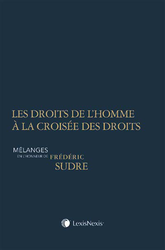
Référence complète : Deguergue, M., Le droit d'alerte : un nouveau droit de l'homme ?, in Mélanges en l'honneur de Frédéric Sudre, Les droits de l'homme à la croisée des droits, LexisNexis, 2018, pp. 157-161.
Lire une présentation générale de l'ouvrage.
Les étudiants de Sciences-Po peuvent consulter l'article via le Drive, dossier "MAFR- Régulation & Compliance".
June 27, 2018
Thesaurus : Doctrine

Référence complète : Mélanges en l'honneur de Frédéric Sudre, Les droits de l'homme à la croisée des droits, LexisNexis, juin 2018, 860 p.
Consulter la table des contributions.
Lire la quatrième de couverture.
Consulter la présentation des articles suivant :
- Deguergue, M., Le droit d'alerte : un nouveau droit de l'homme.
- Andriantsimbazovina, J., La « confiance du public » dans la jurisprudence de la cour européenne des droits de l'homme.
- Oberdorff, H., Vers un statut européen du lanceur d'alerte ?
- Potvin-Solis., L., Le dialogue entre la Cour européenne des droits de l'homme et la Cour de justice de l'Union européenne dans dans la garantie des droits fondamentaux.
- S.Renoux, Th., Mater semper certa est : brèves réfléxions sur la gestation pour autrui et le principe d'égalité.
- Sermet, L., Censure littéraire et apartheid. De la loi et des hommes.
- Vigouroux, C., Le droit est-il soluble dans le renseignement ?
June 27, 2018
Thesaurus : Doctrine

Référence complète : L'ENA hors les murs, Le droit et la justice aujourd'hui. Et demain ?, n°481, juin 2018, 111 p.
Consulter la présentation de l'article de Marie-Anne Frison-Roche, Le Juge, le Régulateur et le Droit.
June 27, 2018
Thesaurus : Doctrine

Référence complète : Vigouroux, C., Le droit est-il soluble dans le renseignement ?, in Mélanges en l'honneur de Frédéric Sudre, Les droits de l'homme à la croisée des droits, LexisNexis, 2018, pp. 843-854.
Lire une présentation générale de l'ouvrage.
Les étudiants de Sciences-Po peuvent consulter l'article via le Drive, dossier "MAFR- Régulation & Compliance".